Humble, Caucasus!
Franz Rubo Taking aul Ahulgo. Panorama 1893 of the year. AKG / EAST NEWS
Nowhere and never has the Russian empire fought for as long as in the Caucasus. Although it would seem: what is for the Russian generals who are used to winning not only the Turks and Iranians, but also Napoleon, a handful of highlanders? However, the outcome of the struggle remained unclear for several decades, and the name of Imam Shamil became synonymous with a formidable and elusive opponent. Only after gaining experience of the war in the mountains, the Russians managed to win in the end.
By mid-August, the 1859 of the year the epic was almost over, but this “almost” got a great price. Russian troops surrounded the mountain, at the top of which was the aul Gunib. It was an impregnable natural fortress: on three sides of the aul defended sheer cliffs, and only from the fourth, eastern, along a narrow path one could climb to the village. Four hundred warriors of Islam, entrenched there with four guns, had many advantages. Prince Alexander Baryatinsky, commander-in-chief of the Caucasian army, knew the temper and courage of these people well, but nevertheless offered capitulation - suddenly he could avoid the last bloodshed. In addition, there was a person in the village who for the past 25 years personified resistance - Imam Shamil. If he had surrendered, it could seriously affect other leaders of the Highlanders.
In the case of obedience, Baryatinsky promised “complete forgiveness to all who were in Gunib, permission for Shamil and his family to go to Mecca, providing him with funds both for travel and maintenance.” But the enemy did not change his character and answered: “Gunib is a high mountain, I sit on it, above me even higher - God. Russians stand below, let them storm. The hand is ready, the saber is taken out. "
22 August began a heavy siege. The next two days were spent in a rifle and artillery shootout, and on the night of 25 in August, the 130 soldiers of the Absheron regiment managed to climb the southern wall of the mountain and overturned the Highlanders there. Immediately began a general assault. By the middle of the day, the Murids (literally “disciples”) of Shamil retreated to the village itself, where the Russians surrounded them with a new dense ring. The tsar's governor again tried his luck - to take the imam of Chechnya and Dagestan alive. And - a miracle! - he agreed. Apparently, the old leader was tired and lost interest in the war. He went out to his enemy, who was waiting for him on a stone a mile from the aul.
The next day a laconic order was published: “Shamil is taken. Congratulations to the Caucasian army. It was a high point in the career of Prince Baryatinsky and, probably, the brightest moment in the life of everyone who participated in the last battle (among them were many famous people - for example, Russian Chief of Staff Dmitry Milyutin, later War Minister Alexander II and author of the famous military reform) . As for Russia, it received a long-awaited peace in the Caucasus.
Caucasian War of Dates
September 12 1801 - Kartli-Kakheti Kingdom (Eastern Georgia) is annexed to Russia
1816 — 1827 - General Alexei Yermolov is in command of the Separate Georgian (from 1820-th - Separate Caucasian) corps
22 June 1818 - the Terrible Fortress was founded
1829 — 1830 - Kazi-Mulla is proclaimed Imam of Dagestan and Chechnya. He announces gazavat Russian
November 13 1831 y. - KaziMully's attack on Kizlyar
October 29 1832 - the capture of the village of Gimry by General Grigory Rosen. Doom of Kazi-Mullah
November 1832 g. - September 1834 g. - Imamat Gamzat-bek
25 August 1834 - Massacre in Khunzakh
September 24 1834 - Shamil proclaimed imam
September - October 1837 - negotiations with Shamil on the acceptance of Russian citizenship by him
January 1841 - Hadji Murad adjoins Shamil
June - July 1845 y. - Darginsky campaign of General Mikhail Vorontsov
The end of 1845 - Vedeno becomes the new (and last) capital of the Imamat
1853 — 1856 - Crimean War
28 January 1858 - General Nikolai Evdokimov seizes Argun Gorge
10 August 1859 g. - Surrounding the village Gunib
25 August 1859 - Shamil's capitulation
May 10 1864 - the manifesto on the end of the Caucasian War was announced in the Kbaada gorge
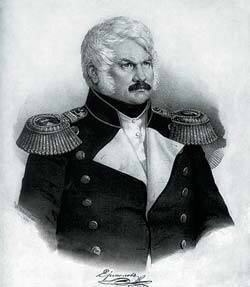 Alexey Ermolov (1772 — 1861), the first “Proconsul of the Caucasus”
Alexey Ermolov (1772 — 1861), the first “Proconsul of the Caucasus”How did it all begin?
However, this world was very conditional. And after the main enemy was captured, say, in the north-west, the fighting continued for another five years and ended only with the destruction of the last stronghold of Circassians (Circassians) in the Kbaad tract - now there is a popular resort Krasnaya Polyana near Sochi. So in encyclopedias, the date of the end of the Caucasian War is often referred to as 1864.
But there is no consensus on when it began, in the scientific world. For some, this is 1801 the year when Eastern Georgia - the Kartli-Kakheti kingdom - joined Russia. It was then that having irrevocably entrenched itself to the south of the Caucasus Mountains, the country faced the need to control passes, and a struggle ensued. Others speak about the date adopted in the Soviet era, the 1817 year, when the famous “royal serdar” Alexei Yermolov appeared on the arena here. And in recent decades, Russian historians have started talking about 1829 — 1830, that is, about the time of the formation of the Imamate, the military theocratic state. Well, for all these concepts there is a reason.
When the Russians decided to take responsibility for Kartli-Kakheti, they unwittingly signed a number of obligations. On the one hand, a convenient base appeared for attacking Turkey and Iran. At the same time, the Russian Tsar undertook to always protect his Georgian subjects. It could not be allowed to repeat something like the defeat of 1795 of the year, which perpetrated the city of Tiflis Aga Mohammed Qajar the Persian - now it threatened a complete loss of prestige. So the uninterrupted communication with Georgia through the lands of the troubled North Caucasian peoples has become an acute need.
It would seem that even Catherine II, the leaders of these peoples many times expressed submissiveness, but one must understand what this expression means in the sense of justice of the mountaineer, accustomed to the will and the absence of any kind of power over himself. This is nothing more than a move, a trick designed for instant profit, or a veiled invitation to unite against the neighbors. From the earliest times until the XIX century, the inhabitants of the great ridge were completely independent and did not hesitate to engage in traditional occupations: robbery, kidnapping for ransom. All this seemed completely natural to them. Suffice it to say that at the end of the 18th century, 2000 rubles were pawned annually in silver for the ransom of Christians "from highland slavery" into the state budget. For the rank and file a few tselovyhs were supposed, for the officer they had asked for no less than 100, and if the prisoner seemed rich or an important person, the figure took off to any limits. Government money was not enough for half of the prisoners.
However, serious hostilities at the beginning of the 19th century were not yet conducted here - Russia did not have to make a final decision on the “Caucasian issue”: Napoleon fought in Europe, while in Asia they had to fight the Persians (1804 — 1813) and the Turks (1806 — 1812) at the same time.
The conquest of the Caucasus was paid for by Russia with great blood. During this huge period, from 1801 to 1864, the total losses of the Russian army in the Caucasus were: 804 officer and 24 143 lower ranks killed, 3154 officer and 61 971 lower ranked, wounded 92 officer and 5915 lower ranks prisoners. In addition, we should not forget about the losses among the civilian population in the Caucasus from the Russian side, which can be estimated at several thousand dead and wounded. According to modern estimates, during the Caucasian Wars, the irretrievable losses of the military and civilian population of the Russian Empire, suffered as a result of hostilities, as well as diseases, and death in captivity, reach at least 77 000. The gigantic number of casualties is explained by the almost continuous battles, the extremely difficult conditions of the theater of operations, and a number of serious miscalculations by the Russian command. In the period 1840 — 1846, the Russian troops suffered the greatest losses in the entire war. 1845 was the most bloody year, when losses amounted to more than 300 officers and 5000 soldiers killed and wounded. Their lion's share falls on the most expensive, in terms of losses, operation - Darginskaya. It is significant that the loss of 1200 people in it exceeded the total losses of the Russian army during the whole war with Persia 1826 — 1828. The intensity and bitterness of the fighting in the Caucasus is underlined by the fact that among the dead were 13 generals and the 21 commander of the unit.
The irretrievable losses in the Caucasian theater are comparable in scale only to the Napoleonic wars at the beginning of the 19th century, when Russian troops lost soldiers and officers to 100 000. Although, it should be noted, the total losses of the Russian side in the wars with Napoleon are much higher than in the Caucasus, and vary from 400 000 to 500 000 people.
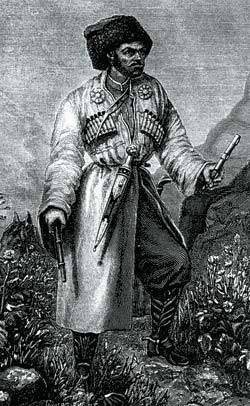 Hadji Murat (end of 1790's - 1852)
Hadji Murat (end of 1790's - 1852)"Proconsul of the Caucasus"
In 1816, General Alexei Petrovich Yermolov arrived in Tiflis - the celebrated hero of World War II, the former chief of the Kutuzov headquarters. He was appointed commander of the Separate Georgian Corps - with the task of once and for all pacifying the mountain peoples and approving the Russian administration in the entire Caucasus. It was assumed that this task can be accomplished in a short time, with minimal human and financial losses, by pinpoint strikes against areas of resistance.
But it took a few experienced commander a little time to come to opposite conclusions. He abandoned the planned campaigns deep into the ridge, reasonably believing that they did not achieve the goal. So, obviously, many lives were saved. Instead, the Russians began to move forward with the whole front, firmly entrenched on every meter of the conquered territory. To facilitate communication with the auls, the forest was cut down at the root of the forest, fortifications were erected, and from them all new defensive lines were gradually formed. Recalcitrant settlements that were behind them were destroyed.
In just a few years, the "Proconsul of the Caucasus" built many fortresses: Grozny (now Grozny, the capital of Chechnya), Sudden, Barrage Stan, Turbulent, Gerzel. Soon, a single row of forts from the Caspian Sea to modern Nazran closed, and from the north to the south the ground was cleared by glades, through which regular detachments quickly penetrated, when necessary, deep into Chechnya and Dagestan. Yermolov sought to isolate these very recalcitrant territories from the north, and then cut them into separate small sectors, where the enemy could no longer enjoy the advantages of rough terrain. In certain parts of the region Yermolov inflicted pinpoint strikes if any Khan showed disobedience. In addition, the general began to frequently take hostages (amanatov) from the mountain nobility.
By the beginning of the 1820-s, most of Dagestan was under Russian control, and many of the Chechen societies recognized the authority of the emperor in a distant unknown St. Petersburg. In 1818 — 1820, all Kabardians were evicted from the Pyatigorsk region, and Cossack villages appeared on the site of their villages - thus the “belt of recalcitrance” was cut into two “fragments” - Zakubansky and Chechen-Tavlinsky.
So with the continued success, Yermolov "commanded the Caucasus" up to the 1827 year, when Nicholas I dismissed him and replaced him with his favorite, Count Ivan Paskevich. And who knows, if the "Proconsul" would remain there further, would the war not end a few decades earlier? In any case, one English traveler, who visited then the Caucasus, wrote about him like that: “Although the measures he sometimes used to pacify the region made people shudder, they should not ignore the result they achieved: during his reign that any child, even with a sum of money, could pass through the provinces subject to him, without being exposed to any danger. ”
In full accordance with local customs and Muslim law, Yermolov entered into a kebin (temporary) marriage with Muslim girls three times. After parting with him, his wives received good pay and could get married again. In addition, Yermolov left them daughters, and took his sons with him. Subsequently, they were all recognized by his legitimate children, becoming hereditary nobles and Russian officers. Since the marriage was concluded by all the rules, with the participation of the mullah, the Highlanders had no complaints about Ermolov.
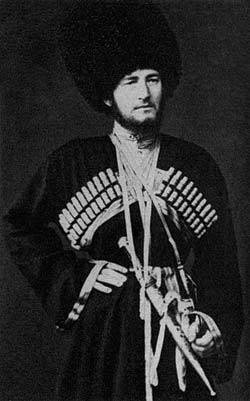 Gazi-Mohammed (1833 — 1902), second son and heir of Shamil
Gazi-Mohammed (1833 — 1902), second son and heir of Shamil True, it was this formidable general that remained in the memory of the Chechens and their neighbors as one of the most hated Russian military leaders, a punisher. Many modern Chechen politicians equate his actions with genocide and claim that they caused the war. The latter, of course, is a great exaggeration, but it must be admitted that to a high degree the policy of the general contributed to the development of Muridism, a movement that became the basis of resistance. The fact is that in the fight against Yermolov many representatives of the old nobility died. There was a vacuum of power, which the imams filled with - military-spiritual national leaders and tribunes. The first of these was Gazi-Mohammed (in Russia they called him Kazi-Mulla), and all he needed to do was formulate clear and simple political slogans: universal equality, the extermination of traitors-aristocrats, the union of the faithful for a holy war against the invaders. Naturally, in order to "conform to the position," he, in contrast to the traditional "secular" aristocracy, had to be a man of scholars and religiously educated. He was him - he remembered by heart the Quran and could win any theological argument.
To rally his peoples, the imam began to vigorously introduce sharia (a code of laws based on the same holy book of Muslims) everywhere instead of the motley and contradictory local adats — the mountain laws that had been formed over the centuries. From the foremen of villages and communities they took an oath to refuse them irrevocably and to administer the court "in Islamic way". And also, of course, interrupt any kind of intercourse with the Russians. In addition, Kazi-Mulla virtually exterminated the remnants of the nobility without exception - he sent several dozen influential beks to the other world.
All this earned him enormous prestige among the common people and allowed him to quickly gather an army of 10 000 soldiers.
For two years, Kazi-Mulla fought with the Russians and their Avar allies and won many victories, sticking to his partisan tactics of raids. The terrible shock caused the looting of the rich city of Kizlyar. Finally, in 1832, Baron Grigory Rosen, who replaced Paskevich, caught the imam in the aul of Gimry and swiftly attacked. Kazi-Mullah chose the wrong tactics - instead of leaving the village, he decided to wait for the Russians and give them a fight. When everyone who surrounded him was killed, he made the last prayer, with a sword rushed to the enemies and died.
He was replaced by one of his closest associates, Gamzat Bey, who changed his strategy, considering that the time had not yet come for a decisive clash. While the court and the case, he continued the widespread "sharia" and the extermination of the nobility. In the summer of 1834, in the Avars capital of Khunzakh, for example, he cut out the entire ruling elite, including killing the old hansha Pakhu-bike with his own hands. Here Gamzat began to form the institutions of a full-fledged state - the imamate. He made Khunzakh his residence - and he was mistaken: the inhabitants of the Avar capital, accustomed to the old order, did not accept the new regime. Against the invader, a conspiracy quickly formed, headed by the bloodthirsty avenger, Haji-Murat, the son of the deceased khan's nurse. The imam was killed in the mosque along with all his surroundings. Thus, the Russian command, unexpectedly for itself, restored power over the Avar land and acquired at its disposal one of the best Caucasian warriors, Hadji Murad, later immortalized by Leo Tolstoy. Allah also sent to the Murids then the greatest of their leaders for the whole history.
Life in the mountains, as is known, is always strikingly different from life on a fertile plain, and this affects literally all spheres of life of the highlanders. It is much harder to feed oneself in narrow gorges - hence the harsh struggle for existence and the need to constantly make daring raids on neighbors, take away livestock, rob property. It is not surprising that the men of the mountains are the generally recognized best warriors in the world. Back in the Middle Ages, all European sovereigns preferred to hire the Scots and the Swiss to serve in combat. And the Montenegrins, for example, defended their tiny state from the giant Ottoman Empire, when Serbs, Bulgarians, Hungarians, Greeks obediently lived under its heel. In faraway Asia, the Nepalese sustained two fairly successful wars with the masters of all of India — the British, and after that the elite regiments of the English army were formed.
In our history, of course, the warriors of the North Caucasus earned a special reputation. Until very late, their combat fervor was directed against each other - they simply did not know powerful external attacks on their lands until the 19th century (we don’t take into account the campaigns of Genghis Khan and Tamerlane in the Caucasus). When the mountaineers finally had to deal with the Russian Empire, they were at their best - precisely because of the refined skills and customs of guerrilla warfare. In addition, the sense of self-preservation inherent in small, free-lance communities worked flawlessly. Muridism gave these Muslims the consciousness of a powerful unity against the infidels. A skilled and shrewd leader banned the blood feud that was ravaging Chechnya and Dagestan, replacing it ... with cash payments, and everyone readily obeyed. The dowry (ransom) for the bride declined ten times - now young people could marry without abducting brides. As a result, the birth rate has grown and, again, the number of inter-clan conflicts has decreased. Finally, all slaves were freed, and the equality of believers declared a sacred principle. True, it was combined with tough discipline. The Imam owned supreme power — military, judicial, administrative, and spiritual. There was no shortage of power in the means: the residents of the imamat regularly paid zakat - a tax commanded in Islam (one-tenth of all income), as well as a fifth of military production (including ransom received for prisoners) and fines for crimes and misdemeanors. Each 10 courtyard of the village was charged with the duty to expose and maintain one fully armed equestrian warrior - this is the strong core of the army. And when absolutely necessary, the people's militia came out of the war of all men from 15 to 50 years. In his troops, Shamil introduced not only insignia — according to the European model, but also signs of shame — felt was sewn to his clothes for his cowardice. This whole set of measures — seemingly unintelligent, but clear and effective, like a dagger strike — has allowed the mountaineers to resist Russia for a full 25 years.
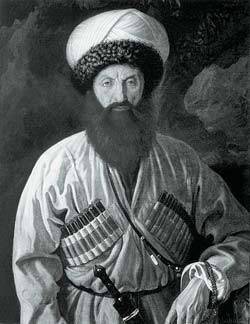 Imam Shamil (1797 — 1871)
Imam Shamil (1797 — 1871) Napoleon Mountains
Even after the death of Kazi-Mullah, Rosen considered the matter largely won and switched to the North-West Caucasus, where the Circassians fought. Under the 1829 agreement, the Turkish sultan "handed over" them under the authority of the Russian tsar. As they say, the Circassian leader, having learned about it, pointed out to the Russian general a bird and said: “General, I give you this bird, take it!” Nevertheless, the resistance here was not so intense, and the imperial troops gradually stopped fortified lines of the enemy deep into fortified lines Russian territory. But it was at this time that Gamzatbek, and then Shamil, once again gathered Chechnya and Dagestan under the green flags. The most far-sighted of the Russian commanders foresaw how much trouble it will bring in the future. Here is what Rear-Admiral Lazar Serebryakov writes in these years: “Every year our inaction removes the achievement of the goal; mountaineers acquire more and more courage, experience, unanimity. Formerly their tribes were forever clothed by civil strife; but with the advent of ours, they had the spirit of nationality, unprecedented agreement, the concept of common efforts; the war with us has stopped their strife, their alliance is becoming closer and closer each day, and if we don’t warn them to conquer, then we can’t vouch for a man with a wild genius and a strong character who always ignites in the hearts of Asiatic fanatic passions. And, becoming in the brow of the people, he will join us for his robbery in the right, stubborn and bloody struggle. ”
So it happened. True, in 1837, the Russians defeated Shamil, and there was even hope that he would officially swear allegiance to Nicholas I. But the negotiations broke down. It turned out that the imam was cunning in his mountain style - at the very last moment he refused to go to Tiflis, saying: I am not at all sure that they will not catch me there.
General Yevgeny Golovin, who replaced Rosen, had to continue building fortresses — right from the mouth of the Kuban to Mingrelia itself. Only in 1839 did he decide to advance in two directions to the Northeast Caucasus. Shamil sat under siege in Ahulgo for two months, he gave his first-born Jemal-Eddin hostage for the start of negotiations, but he never gave up. The aul was taken by assault, and the imam managed to break through and leave with only a few close associates.
Muridism seemed defeated. But General Pullo, a subordinate of Golovin, began to plunder and disarm the local population, as a result of which Shamil regained power in a matter of days. The Russians began to lose. In the 1842 campaign of the year, the army lost 1500 soldiers and officers - a great deal for the Caucasian War. In the next few years, the imam, in front of surprised contemporaries, captured the whole of Dagestan and most of Chechnya, destroyed many fortifications - the fruits of the hard work of Russian soldiers - along with their garrisons. For 1843, the Imamate widened more than twice. Even the famous Hadji Murad, having left the Russian camp, became Shamilyov Naib (governor) of the Accident. In the meantime, the Circassians ravaged and demolished four fortifications of the Black Sea coastline. From the sea, the Turks and the British helped them in every way, at the same time leading an active criticism of Russian policy on the Black Sea coast.
In Russia, Shamil, to his surprise, waited for a magnificent reception. After visiting Moscow and St. Petersburg, after meetings with Alexander II and Yermolov, the Caucasian leader with his entire family settled in Kaluga. From here he wrote letters to the Caucasus, calling on those who had not yet folded weapons, do it and come to terms with Russia. In the 1866 year, after the attempt on the tsar, he entered Russian citizenship, and in 1869 he was finally able to make the hajj to Mecca, and then to Medina, where he died. Of the five sons of Shamil, two died before him. The firstborn Jemal-Eddin, taken to amanaty in 1839, received Russian upbringing and education, and, returning 16 years later to his father, tried to influence him to make peace with the Russians, but unsuccessfully. He did not live to see the surrender of the Imam. The second son of Imam, Ghazi-Mohammed, whom Shamil considered his successor, did not reconcile himself in his heart with the Russians. In 1871, he left Russia and entered the service of the Turkish sultan. In the Russian-Turkish war, he besieged the fortress of Bayazet, but to no avail. He completed the service in the rank of marshal. Mohammed Kamil, the youngest son of Shamil, also became the general of the Turkish army. But Mohammed-Shefi, the fourth son of the imam, chose Russian military service and also became a general, but in Russia. In the Russian-Turkish war, he was asked to go to the front, but he did not get permission for this, apparently because his brother had already fought on the other side, even if by that time they were in a quarrel. Mohammed Shefi’s son-in-law, one of the most prominent revolutionaries of the Caucasus nicknamed Makhach, also became famous; his name still bears the city of Makhachkala. Today, the only direct descendant of Shamil in the male line is his great-great-grandson, and he lives in Moscow.
Dargin disaster and a turning point in the war
All these obvious failures could not but lead to the next change of the Russian command. Mikhail Semenovich Vorontsov, appearing at the theater of military operations in 1845, became the head of a special administrative unit - the Caucasian governorship. For the first time, all military and civilian power in the Caucasus was concentrated in one hand. Its owner, the king set the only task: completely smash Shamil and capture his residence Dargo. Experienced generals doubted the success of such an adventurous campaign, but, as we know, they do not argue with the monarch.
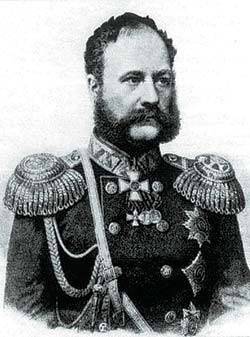 Prince Alexander Baryatinsky (1814 — 1879), winner of Shamil
Prince Alexander Baryatinsky (1814 — 1879), winner of Shamil This Dargin expedition 1845 of the year turned for Russia the biggest failure in the Caucasus in all the years of the war. Vorontsov occupied Dargo, abandoned and burned by murids (Shamil soon built himself a new residence in Vedeno) and ... found himself trapped there. Practically without food, with a minimum of ammunition, burdened with a whole wagon train, the Russian detachment could not move quickly forward or backward. Only the arrival of reinforcements saved Vorontsov himself, and the losses amounted to three generals, 186 officers and more 3600 soldiers killed and wounded.
I had to go back to the tactics of Yermolov. And soon there were results. In the second half of 1840, Shamil could no longer move on to conquer new provinces. Soon he had to go to the defense. In 1846, he made the last shot from his lair: at the head of a ten-thousandth army, he made his way through the Sunzhenskaya line and invaded Kabarda. But this, in essence, gave him nothing. And the ring around Chechnya and Dagestan everything was compressed.
In the winter of 1851 — 1852, Big Chechnya was already under attack, and its residents gradually switched to the Russian side. By the way, by this time Shamil’s power was discontent with them. His idea to turn the Imamat into a hereditary monarchy (the son of the imam became the successor) did not like the naibs. Hadji Murad, for example, considered himself worthy of inheriting power. And when it became clear that he had no chance, he fell out with the imam and returned under the banner with the double-headed eagle.
Year 1852. The arena of bitter struggle was the most populated part of Chechnya - Germenchuk and Avtury, the imamate's breadbasket. February 1853. Baryatinsky defeated the main forces of his enemy - 20 000 soldiers in an open field (more precisely, in an “open” gorge near the Michik river). It would seem that everything, the end of Shamil - a victory! But fate was favorable to the head of the Murids - at that moment the great Crimean War flared up.
The British and French hoped that the imam would open a new front for them in aid — strike the rear of the Russians who were advancing on the Turks in Transcaucasia. But nothing came out of secret intercourse with him - the forces of the mountaineers were really exhausted, they were tired of continuous war and clearly did not want to die for the interests of others. In addition, Shamil, recognizing Sultan Abdul-Mejid I as his patron, preferred to stay away from him.
The fall of the imam
In the 1853 — 1856 years, during the Crimean campaign, an informal truce was established in the Caucasus: the Russians did not disturb the highlanders, Shamil did not attack either. At that time, according to historian Vladimir Degoyev, “a kind of strategic balance was established in the Caucasus, which could continue indefinitely.” But too much money was spent on the war, and it was time to finish with it. As soon as the great international conflict ended, the new emperor Alexander II decided to act immediately. He appointed a new Caucasian governor, who was destined to put an end to this long confrontation. Prince Alexander Baryatinsky was a tsar's personal friend and an experienced military man, with great Caucasian experience.
The new commander vigorously set to work. New glades were laid in the forests, as the troops moved, new forts grew. Shamil had fewer subjects, fewer people believed in his lucky star. The economic life of the imamat was approaching collapse.
In the 1858 year, thanks to successful misinformation, the Russians marched into the strategically key Argun ravine with a rapid march. 15 of the Chechen societies between Argun and Terek immediately expressed obedience to Russia, and Shamil was defeated near Vladikavkaz, where he tried to get out with a bold counter-attack along the enemy’s rear. The losses in the Russian army at the same time became noticeably less - the experience of the previous decades had affected, and the area already seemed familiar.
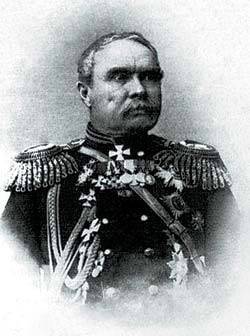 Nikolay Evdokimov (1804 — 1873), associate of Baryatinsky
Nikolay Evdokimov (1804 — 1873), associate of Baryatinsky At the beginning of 1859, the Murids retreated to the well-fortified Vedeno, but General Nikolai Evdokimov, the closest associate of Baryatinsky, took them out. 10 000 Highlanders under the command of the son and heir Shamil did not frighten him. The preparatory work for the assault was conducted throughout March, and on April 1 the fortress fell. From 6 in the morning to 6 in the evening, Evdokimov used to break enemy positions with artillery, after which he went hand to hand, and by 10 hours in the evening there was not a single person left in the village. And the Russians lost only two dead.
The last act is Gunib. To prevent Shamil from leaving this time, the tsarist army was advancing from three sides at once - from the northwest, north and south. And, oddly enough, almost no one interfered with them: the locals treated Baryatinsky and his subordinates better than their predecessors. The “new” Russians did not want to insult the religious feelings of the mountaineers, were reputed to be generous and fair, and helped the villagers with food and medicine. The prince found an approach to influential people with the help of a tried and true means - money. So, little by little, the Russian side was accepted by many close imams, elders and whole teips. Only a few associates remained loyal to the old leader to the end. By the beginning of the siege of Gunib almost no one, except himself, no longer resisted.
After the capture of Shamil, separate groups of the Highlanders, of course, appeared still here and there: Naib Baysangur was captured and executed only in 1860. According to the legend, which is actively relayed on modern Chechen sites, he was with Shamil in Gunib, but refused to give up and managed to break the ring with 30 Chechens. However, this is only a legend. Ended and the resistance of the Circassians. Mohammed-Emin, one of their main leaders, surrendered after Shamil, and then, within the framework of the Muhajir movement and under the influence of Turkish propaganda, most of them emigrated to the Ottoman Empire.
So ended the Caucasian War. Strangely enough, even now, after two new Chechen conflicts, not much has been written about it. But in the social and political history of Russia, she played a huge role. This confirms the legacy of the XIX century writers and artists: Pushkin, Lermontov, Tolstoy, Aivazovsky, Gagarin and many others reflected in their work the Caucasian theme.
But the most serious imprint remained, of course, in the minds of the peoples. Nowhere else do we remember the old disputes so well as in a traditional society, and Caucasian society in many ways remained. And as soon as the central power in St. Petersburg or Moscow weakens, old quarrels flare up in the Caucasus - between the peoples of the Great Range and between them and Russia. So it was during the Civil War. So it was in 1990. God forbid, to continue to be otherwise.
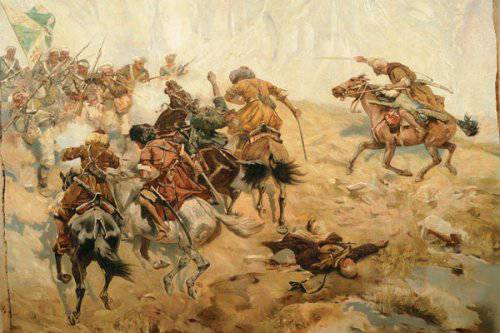
Information